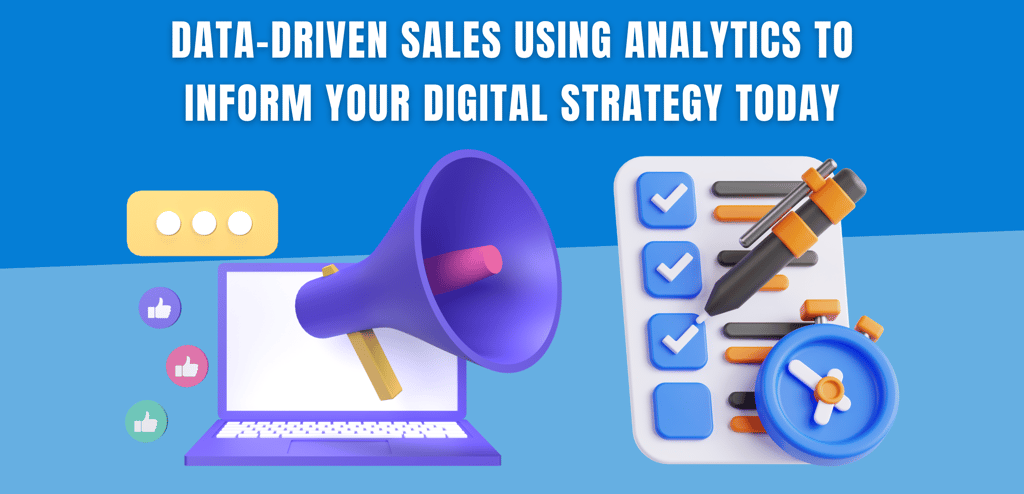
Data-Driven Sales Using Analytics to Inform Your Digital Strategy
By AZ Konnect Team
6/26/20243 min read


In the modern business landscape, leveraging data to drive sales is no longer a competitive advantage—it's a necessity. Data-driven sales strategies allow businesses to make informed decisions, optimize marketing efforts, and ultimately, boost revenue. By harnessing the power of analytics, companies can gain deep insights into customer behavior, identify trends, and tailor their digital strategies for maximum impact. Here’s how you can use data analytics to inform and enhance your digital sales strategy.
1. Understanding Your Audience
The foundation of any successful sales strategy is a thorough understanding of your target audience. Data analytics provides a wealth of information about your customers, from demographic details to purchasing behaviors and preferences.
Steps to understand your audience:
Segment your audience: Use data to divide your audience into distinct groups based on characteristics such as age, location, and buying habits.
Create detailed personas: Develop customer personas that represent your ideal customers, incorporating data on their needs, pain points, and motivations.
Track behavior: Use web analytics tools to monitor how visitors interact with your website, including pages visited, time spent, and actions taken.
2. Personalizing Customer Interactions
Personalization is key to engaging today’s consumers. By using data to tailor your communications and offers, you can create a more relevant and compelling customer experience.
How to personalize interactions:
Dynamic content: Use data to dynamically change content based on the user’s behavior and preferences.
Targeted email campaigns: Segment your email list and send personalized messages that address the specific interests and needs of each group.
Product recommendations: Implement recommendation engines that use purchase history and browsing behavior to suggest products.
3. Optimizing Sales Funnels
Data analytics can reveal where potential customers are dropping off in your sales funnel, allowing you to address these pain points and improve conversion rates.
Strategies for funnel optimization:
Analyze drop-off points: Use tools like Google Analytics to identify stages in the funnel where users are exiting.
A/B testing: Test different versions of your webpages and emails to see which performs better in guiding users through the funnel.
Simplify the process: Remove unnecessary steps in the checkout process to reduce friction and make it easier for customers to complete their purchases.
4. Enhancing Marketing Campaigns
Data-driven insights can significantly enhance the effectiveness of your marketing campaigns, ensuring that your resources are focused on the most promising strategies.
Enhancing marketing with data:
Measure campaign performance: Track key metrics such as click-through rates, conversion rates, and ROI to determine the effectiveness of your campaigns.
Adjust in real-time: Use real-time data to make adjustments to your campaigns on the fly, optimizing for better performance.
Predictive analytics: Use historical data to predict future trends and customer behaviors, allowing you to proactively adjust your strategies.
5. Improving Customer Retention
Acquiring new customers is important, but retaining existing ones is even more crucial for long-term success. Data analytics can help you understand why customers leave and how to keep them engaged.
Retention strategies with data:
Churn analysis: Identify patterns that lead to customer churn and take proactive steps to address these issues.
Loyalty programs: Use data to create personalized loyalty programs that reward repeat customers.
Customer feedback: Analyze feedback from surveys and reviews to identify areas for improvement and address customer concerns promptly.
6. Leveraging Social Media Insights
Social media platforms provide a goldmine of data that can be used to refine your sales strategy and engage with your audience more effectively.
Using social media data:
Monitor engagement: Track likes, shares, comments, and mentions to understand what content resonates with your audience.
Sentiment analysis: Use tools to analyze the sentiment of social media mentions and gain insights into customer opinions and attitudes.
Influencer partnerships: Identify and collaborate with influencers who have a significant impact on your target audience.
Conclusion
In the digital age, data-driven sales strategies are essential for staying competitive and achieving growth. By leveraging analytics, businesses can gain valuable insights into customer behavior, personalize interactions, optimize sales funnels, enhance marketing campaigns, improve customer retention, and leverage social media insights. Embrace a data-driven approach to inform your digital strategy, and you’ll be well-equipped to make smarter decisions that drive sales and foster long-term success.
Integrate these practices into your sales strategy, and watch as data transforms your approach, leading to more informed decisions and better business outcomes
Subscribe To Our Newsletter


